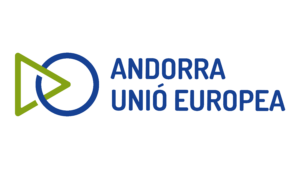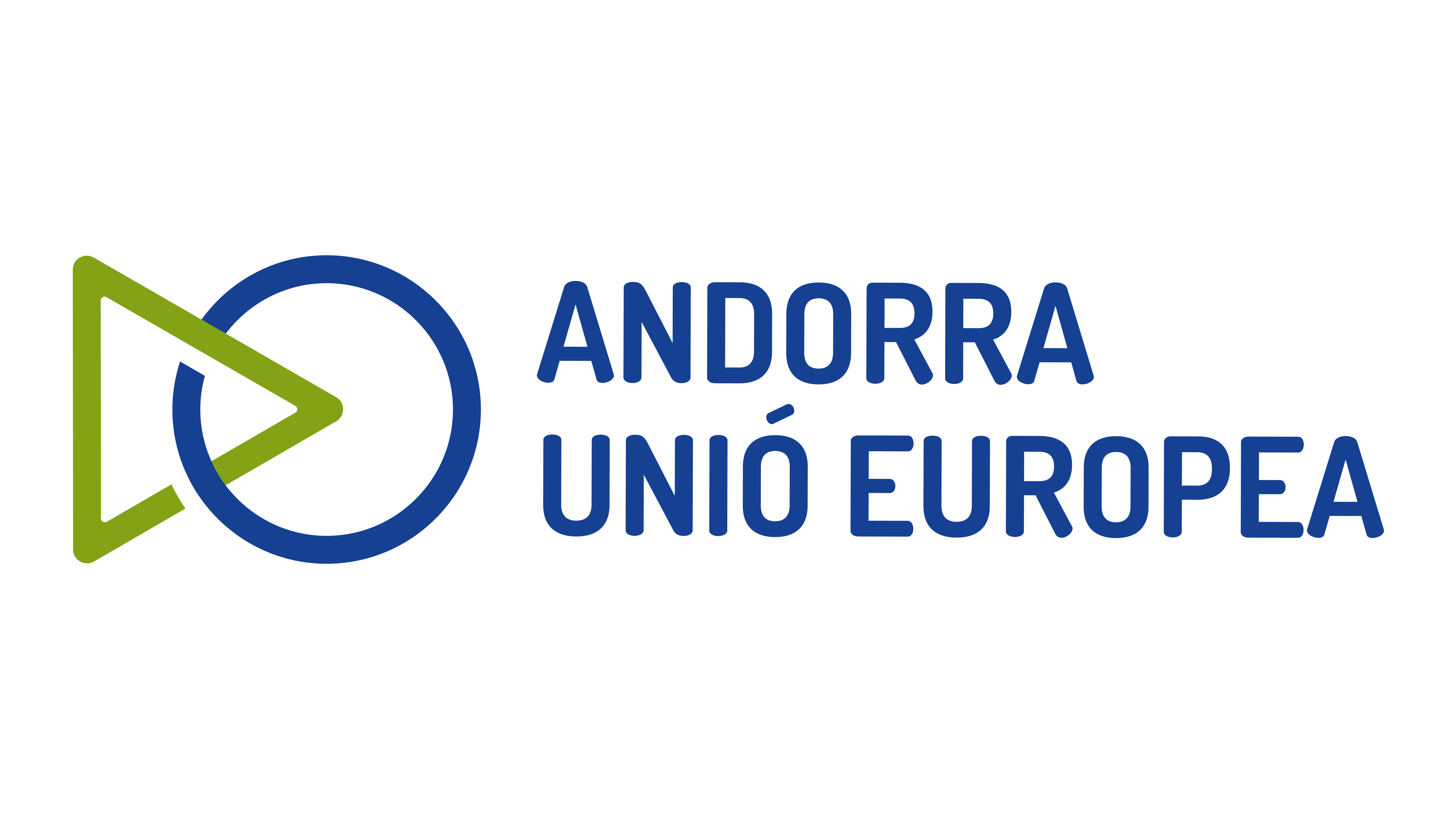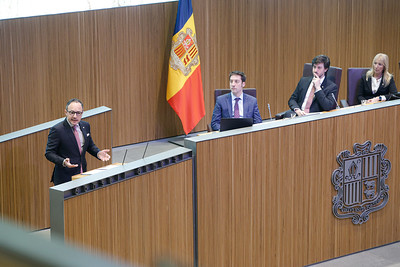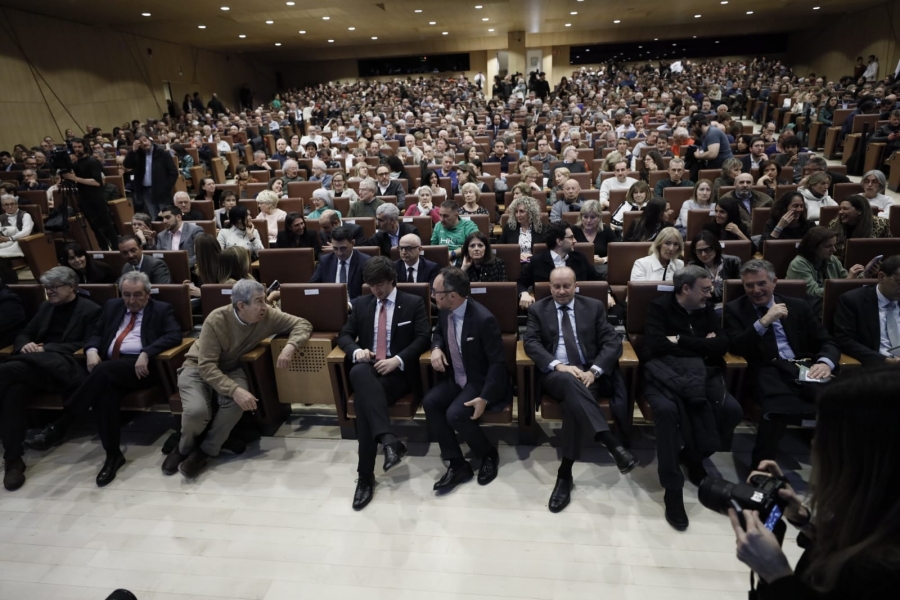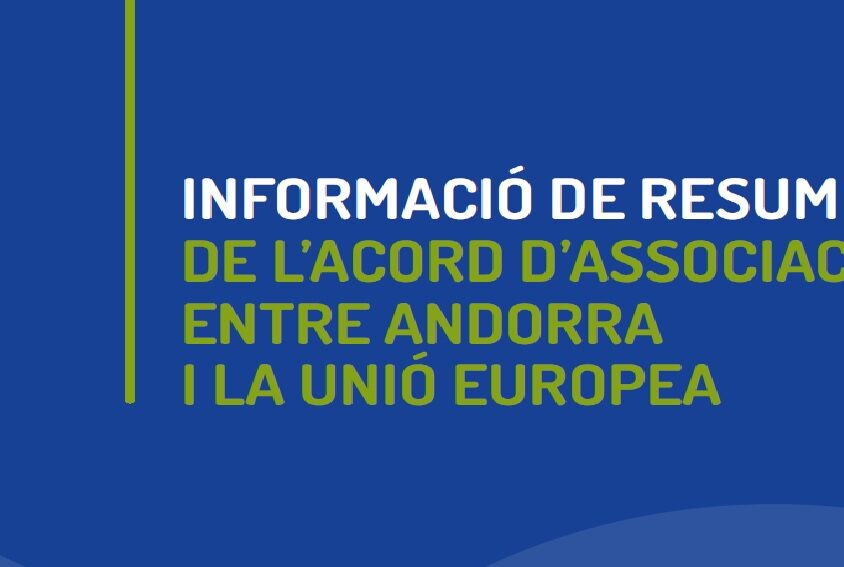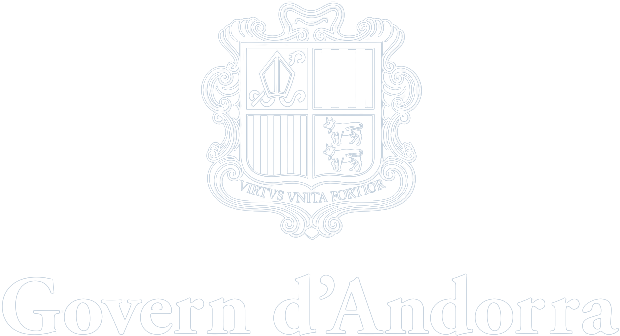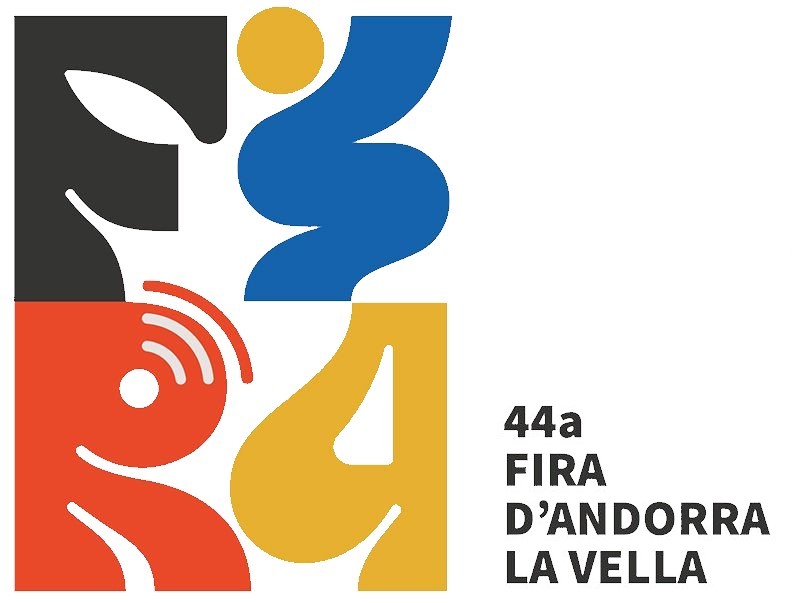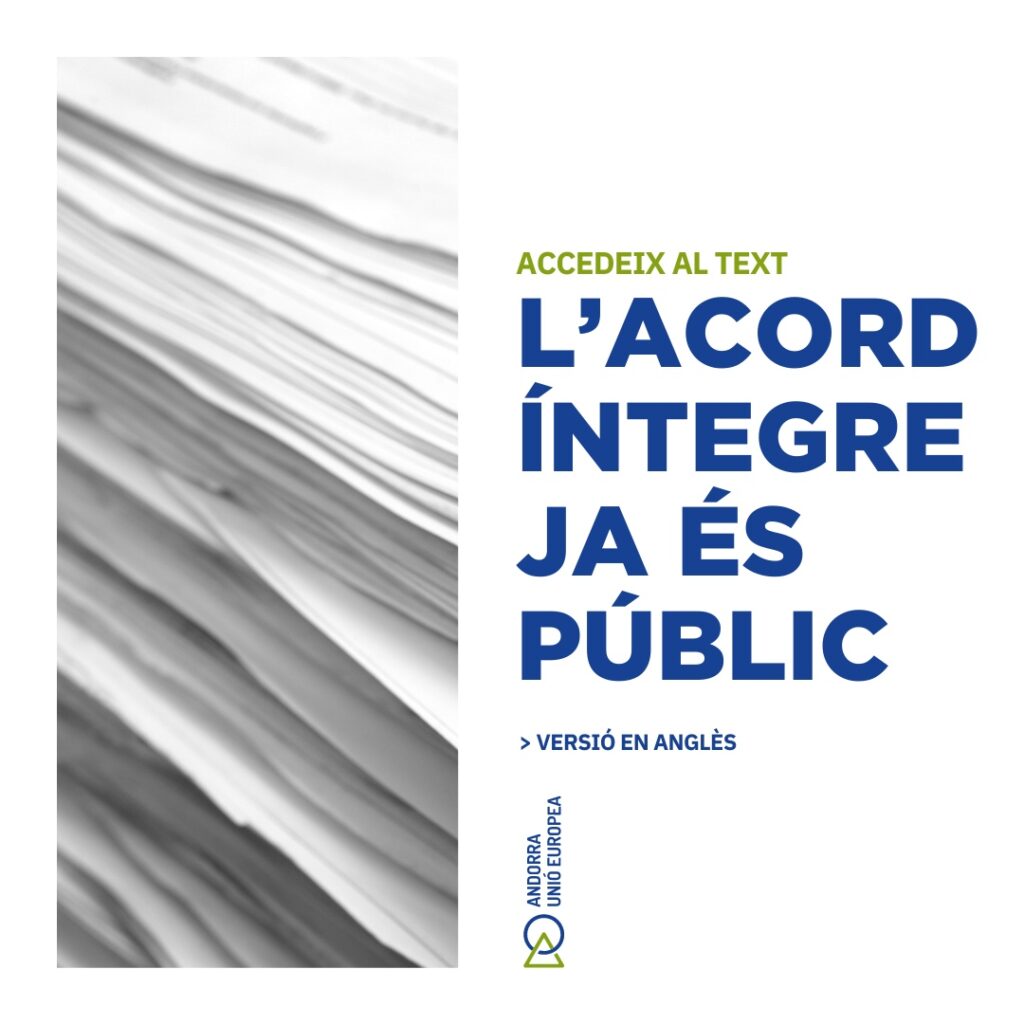què t'aportarà l'acord?
Amb l’Acord, Andorra incorpora els principis de lliure circulació de mercaderies, persones, serveis i capitals del mercat interior de la Unió Europea, i incorporar la normativa europea negociada (l’anomentat cabal comunitari).
AGENDA 2024
- Dimecres 21
Reunió amb la Junta directiva de la Confederació Empresarial Andorrana - Dijous 22
Xerrada a l’escola Maria Moliner
Trobada amb els representants del sector de les empreses de neteja i la CCIS - Dilluns 26
Trobada amb l’Associació Eix Central
Presentació de l’Acord d’associació al Club Internacional d’Andorra (anglès) - Dimarts 27
Presentació de l’Acord d’associació a l’Associació de Propietaris de Béns Immobles
Xerrada sobre l’Acord d’associació al Centre de Formació al Llarg de la Vida
- Divendres 01
Xerrada sobre l’Acord d’associació al Lycée Comte de Foix - Dilluns 04
Xerrada sobre l’Acord d’associació al Lycée Comte de Foix
Xerrada sobre l’Acord d’associació amb els estudiants d’Educació de l’UdA
Presentació de l’Acord d’associació al Club Internacional d’Andorra (francès)
- Dimarts 05
Xerrada sobre l’Acord d’associació amb els estudiants d’Empresa i Informàtica de l’UdA
Xerrada sobre l’Acord d’associació amb el personal docent i administratiu de l’UdA - Dijous 07
Café i converses: Camí de l’Acord d’associació (acte públic amb reserva prèvia per mail o whatsapp, Café-Restaurant l’Isard, Andorra la Vella a les 09h30) - Divendres 08
Xerrada sobre l’Acord d’associació al Lycée Comte de Foix - Dilluns 11
Xerrada sobre l’Acord d’associació a Sant Ermengol - Monogràfic sobre l’Acord d’associació als ambaixadors d’Andorra.
- Dimarts 12
Acte públic d’informació de l’Acord d’associació (20h00 a l’Auditori del Centre de Congressos d’Andorra la Vella) - Dijous 21
Sessió informativa sobre l’Acord d’associació amb la Unió Europea, al Consell General a partir de les 09h30.
- Divendres 22
Café i converses: Camí de l’Acord d’associació (acte públic amb reserva prèvia per mail o whatsapp, Café-Restaurant l’Isard, Andorra la Vella a les 09h30) - Dilluns 25
Trobada organitzada per la Cambra de Comerç, indústria i Serveis amb la consultora de recursos humans.
- Dimecres 27
Trobada informativa amb el Ple de la Cambra de Comerç, Indústria i Serveis
- Divendres 05
Café i converses: Camí de l’Acord d’associació (acte públic amb reserva prèvia per mail o whatsapp, Café-Restaurant l’Isard, Andorra la Vella a les 09h30) - Dilluns 15
Lectura comentada del projecte d’Acord d’associació als Cònsols i Consellers dels comuns. - Dimarts 16 (per confirmar)
Lectura comentada del projecte d’Acord d’associació als mitjans de comunicació.
- Divendres 19
Café i converses: Camí de l’Acord d’associació (acte públic amb reserva prèvia per mail o whatsapp, Café-Restaurant l’Isard, Andorra la Vella a les 09h30) - Dilluns 22
Trobada amb els membres de la Societat de Gestió Col·lectiva de Drets d’Autor i Drets Veïns del Principat d’Andorra - Dijous 25
Presentació de l’Acord d’associació als membres de l’AR*I
- Divendres 03
Café i converses: Camí de l’Acord d’associació (acte públic amb reserva prèvia per mail o whatsapp, Café-Restaurant l’Isard, Andorra la Vella a les 09h30) - Dilluns 06
Reunió amb representants dels Col·legis professionals i el Consell de Col·legis Professionals d’Andorra. - Divendres 17
Café i converses: Camí de l’Acord d’associació (acte públic amb reserva prèvia per mail o whatsapp, Café-Restaurant l’Isard, Andorra la Vella a les 09h30). - Divendres 31
Café i converses: Camí de l’Acord d’associació (acte públic amb reserva prèvia per mail o whatsapp, Café-Restaurant l’Isard, Andorra la Vella a les 09h30).
Febrer
Dimecres 21
Reunió amb la Junta directiva de la Confederació Empresarial Andorrana
Febrer
Dijous 22
Xerrada a l’escola Maria Moliner
Trobada amb els representants del sector de les empreses de neteja i la CCIS
Febrer
Dilluns 26
Trobada amb l’Associació Eix Central
Presentació de l’Acord d’associació al Club Internacional d’Andorra (anglès)
Febrer
Dimarts 27
Presentació de l’Acord d’associació a l’Associació de Propietaris de Béns Immobles
Xerrada sobre l’Acord d’associació al Centre de Formació al Llarg de la Vida
Març
Divendres 01
Xerrada sobre l’Acord d’associació al Lycée Compte de Foix
Març
Dilluns 04
Xerrada sobre l’Acord d’associació al Lycée Compte de Foix
Xerrada sobre l’Acord d’associació amb els estudiants d’Educació de l’UdA
Presentació de l’Acord d’associació al Club Internacional d’Andorra (francès)
Març
Dimarts 05
Xerrada sobre l’Acord d’associació amb els estudiants d’Empresa i Informàtica de l’UdA
Xerrada sobre l’Acord d’associació amb el personal docent i administratiu de l’UdA
Març
Dimecres 06
Trobada amb els representants de Associació Nacional de Negociants, Importadors i Exportadors de Mercaderies Industrials d’Andorra i la CEA
Març
Dijous 07
Café i converses: Camí de l’Acord d’associació (acte públic amb reserva prèvia per mail o whatsapp, Café-Restaurant l’Isard, Andorra la Vella a les 09h30)
Trobada amb els representants de l’Associació Andorrana de Gestors de Persones (AAGP)
Març
Divendres 08
Xerrada sobre l’Acord d’associació al Lycée Compte de Foix
Març
Dilluns 11
Xerrada sobre l’Acord d’associació a Sant Ermengol
Març
Dimarts 12
Xerrada sobre l’Acord d’associació amb alumnes d’economia de l’Escola andorrana de Batxillerat
Acte públic d’informació de l’Acord d’associació (19h30 a l’Auditori del Centre de Congressos d’Andorra la Vella)
Març
Divendres 22
Café i converses: Camí de l’Acord d’associació (acte públic amb reserva prèvia per mail o whatsapp, Café-Restaurant l’Isard, Andorra la Vella a les 09h30)
Març
Dimecres 27
Trobada informativa amb el Ple de la Cambra de Comerç, Indústria i Serveis
Abril
Divendres 05
Café i converses: Camí de l’Acord d’associació (acte públic amb reserva prèvia per mail o whatsapp, Café-Restaurant l’Isard, Andorra la Vella a les 09h30)
Abril
Divendres 19
Café i converses: Camí de l’Acord d’associació (acte públic amb reserva prèvia per mail o whatsapp, Café-Restaurant l’Isard, Andorra la Vella a les 09h30)
Abril
Dimarts 23
Trobada amb els membres de la Societat de Gestió Col·lectiva de Drets d’Autor i Drets Veïns del Principat d’Andorra
Maig
Divendres 03
Café i converses: Camí de l’Acord d’associació (acte públic amb reserva prèvia per mail o whatsapp, Café-Restaurant l’Isard, Andorra la Vella a les 09h30)
ET DONEM RESPOSTA
Preguntes i respostes sobre l’Acord d’Associació
Andorra esdevindrà un estat membre de la Unió Europea amb l’Acord d’associació?
No, ja que no es tracta d’una adhesió, sinó d’una associació i per tant Andorra seguirà sent un estat tercer a la UE. A diferència dels estats membres, no haurà de participar en el finançament del pressupost anual de la UE, ni aportar recursos humans a les institucions de la UE. El Principat mantindrà la seva sobirania com a estat i preservarà la independència en matèria fiscal, de política exterior i de control de les fronteres.
Es mantindran les fronteres tal com les coneixem?
L’Acord d’associació no inclou la qüestió de la fiscalitat. L’Acord no elimina les fronteres físiques ni tampoc les fronteres fiscals i, per tant, Andorra i la UE continuen sent dos territoris fiscals diferents, en què cada part defineix i aplica sobiranament la seva pròpia fiscalitat.
Per què es preveu un referèndum per a l’Acord d’associació?
La legislació andorrana no obliga a fer un referèndum per a aquest Acord. És el Govern actual que s’ha compromès a realitzar un referèndum consultiu, d’acord amb el que estableix la Llei qualificada del règim electoral i del referèndum. Tot i tractar-se d’un referèndum consultiu, el cap de Govern s’ha compromès a fer vinculant el resultat que s’hi expressi.
La vostra opinió és important en aquest procés.
Envieu-nos preguntes, dubtes o comentaris.
